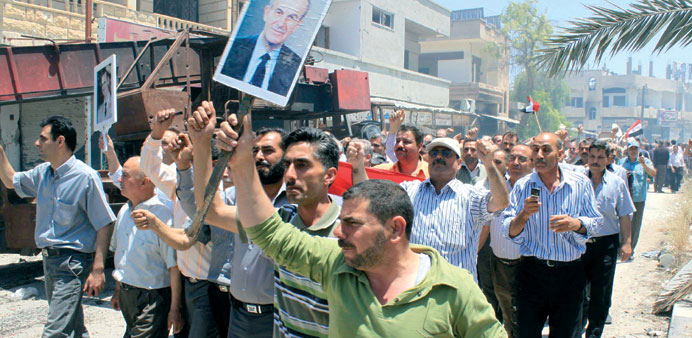Civilians hold up pictures of Syria’s President Bashar al-Assad and of his father, Syria’s late president Hafez al-Assad, as they celebrate the regime’s victory in Qusair yesterday.
AFP/Beirut
Syria’s army yesterday recaptured the only Golan Heights crossing on the ceasefire line with Israel, in another setback for rebels a day after they were blasted out of the strategic town of Qusayr.
As the rebels were driven back on the southwestern plateau, government troops also pursued insurgents who abandoned Qusayr, bombarding a nearby village where they fled to along with hundreds of wounded civilians.
Qusayr’s capture gives President Bashar al-Assad the upper hand if a US-Russian plan for the first direct peace talks with his opponents materialises, analysts say.
Russia said Syrian Foreign Minister Walid Muallem would lead a government delegation at the “Geneva 2” talks which have been delayed largely over opposition disputes about who will attend.
The rebels briefly took control of the Quneitra crossing, strategically and symbolically important for its proximity to Israel and to Damascus, before being forced out.
“The Syrian army has recovered control of the crossing, there are sounds of explosions from time to time but far less than in the morning,” an Israeli source said.
An AFP correspondent confirmed forces loyal to Assad recaptured the frontier post, saying he could see tanks inside the area.
Both the Syrian Observatory for Human Rights and Israeli army radio said the rebel advance included fierce fighting in nearby Quneitra town.
Two peacekeepers suffered “minor injuries” in shelling, a UN peacekeeping spokesman said.
In Vienna, the government said Austria will withdraw its UN contingent.
“The... threat to the Austrian soldiers has reached an unacceptable level. The events of this morning show that it is no longer justifiable to wait and see,” a statement said.
Neutral Austria has been part of the UN Disengagement Observer Force in the Golan since its inception in 1974 and is currently one of the biggest UNDOF contributors, with some 380 troops.
The Quneitra crossing, the only direct passage between Israel and Syria, is used almost exclusively by Druze residents of the Golan who are allowed to cross to study, work or get married.
Israel seized a large section of the plateau from Syria in the 1967 Six-Day War and annexed it in 1981, a move never recognised internationally.
Yesterday’s developments came as soldiers hunting rebels who fled from Qusayr fired missiles at Eastern Bweida about 14km away, the Observatory said.
Its director Rami Abdel Rahman expressed concern for the safety of “at least 500 injured people” in Eastern Bweida.
Qusayr, just 10km from Lebanon, was once home to more than 25,000 people. But thousands fled during the blistering 17-day regime onslaught led by fighters from the Lebanese Shia movement Hezbollah.
“Qusayr is completely destroyed, and totally deserted,” Abdel Rahman told AFP.
The regime “has called on Qusayr’s residents to return home, but there is nothing but ruins. How are they supposed to return?”
Witnesses said bulldozers were working yesterday to clear the rubble in Qusayr. Hours after Qusayr fell, at least five rockets fired from Syria hit the eastern Lebanese city of Baalbek, a Hezbollah stronghold.
Two struck in the city’s Roman ruins and the other three hit the city centre, a security source told AFP. Two people were hurt.
The fighting came as Paris said the international community must respond to test results from both French and British laboratories confirming the use of banned nerve agent sarin in Syria’s war. The US asked Paris to share its data, which France said it has done.
Russian, US and UN diplomats on Wednesday admitted a widely anticipated peace conference would not take place as planned this month.
A date has still to be fixed for the talks on 26-month conflict, which is estimated to have killed more than 94,000 people.
The head of the Russian FSB security service, Alexander Bortnikov, told a security forum on Thursday some 200 Russian Islamists are fighting in Syria for Al Qaeda.
On the humanitarian front, the European Union said it will give another 400mn euros ($527mn) in humanitarian aid to help Syria and neighbouring nations cope with increased refugee numbers. The EU has already provided some 840mn euros.

